|
|
|
Sort Order |
|
|
|
Items / Page
|
|
|
|
|
|
|
| Srl | Item |
| 1 |
ID:
132917
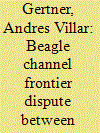

|
|
|
|
|
| Publication |
2014.
|
| Summary/Abstract |
The Beagle Channel crisis (1977-1984) unfolded in a global political context. In other words, it was never solely a bilateral matter between Argentina and Chile, as many analyses have suggested. From the international arbitration to the participation of a third actor (the Vatican), the role of the United States, the Falklands war and the United Kingdom, the Beagle crisis had pronounced regional and international dimensions. Domestic structures and international conditions affected the Argentinian and Chilean foreign policies to different degrees. The Beagle crisis resolution has been explained by reference to the key role played by the Vatican. However, recently declassified US documents and interviews with key actors reveal a different story. International sanctions for human right violations were affecting both countries' leverage in the international community and creating internal political problems. This finding suggests that both countries were keen to use mediation as a strategy to remove human rights violations from the US agenda.
|
|
|
|
|
|
|
|
|
|
|
|
|
|
|
|
| 2 |
ID:
172698
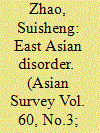

|
|
|
|
|
| Summary/Abstract |
In the South China Sea territorial disputes, China has shifted from a delaying strategy characterized by strategic ambiguity to strategic clarity and an increasingly assertive stance. Yet, this power play, asserting sovereignty over a large portion of the South China Sea, has not prompted a decisive push-back from regional states or major powers, raising the question of what kind of norms China will bring to the regional order and indicating the difficulty of building rules-based order in a region characterized by unbounded power politics in a twenty-first-century Hobbesian struggle.
|
|
|
|
|
|
|
|
|
|
|
|
|
|
|
|
| 3 |
ID:
140354
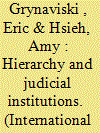

|
|
|
|
|
| Summary/Abstract |
International arbitration is a distinctive feature of both contemporary international politics and the ancient world. Explanations of arbitration in the international relations literature generally posit that states engage in arbitration to mitigate the effects of competition in an anarchical system, or that the practice of arbitration reflects democratic norms. However, an examination of arbitration during the paradigmatic case of the Hellenistic period (338–90 bce) casts doubt on the existing literature. Hierarchy rather than anarchy better characterizes the political context in which arbitration took place: the Greeks often organized themselves into alliances or leagues in which a hegemon dominated decision making, or into federal states with a common foreign policy. This hierarchical setting was a necessary condition for international arbitration where the practice of arbitration was a tool to legitimize hierarchical powers. We assemble an original data set of Hellenistic arbitrations, and use qualitative comparative analysis to show that hierarchy was almost always a necessary condition for international arbitration. Process-tracing of arbitration under three political orders—hegemonic kingdoms in the Greek world, Greek federations, and the Roman Empire—shows that arbitration as a particular means of dispute resolution was used as an ideological device to build and legitimize international order. We then analyze the contemporary record, finding a role for hierarchy in modern international arbitration.
|
|
|
|
|
|
|
|
|
|
|
|
|
|
|
|
| 4 |
ID:
132918
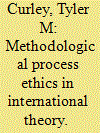

|
|
|
|
|
| Publication |
2014.
|
| Summary/Abstract |
In this review essay, I identify a commonality between Patrick Thaddeus Jackson's The Conduct of Inquiry and Daniel J. Levine's Recovering International Relations: an ethical methodological process to organize international theories in ways that promote a plurality of visions. Jackson's ideal-typification of the various methodological approaches in international relations encourages a pluralistic science. Likewise, Levine's constellation method demands a multiplicity of theoretical perspectives, in order to sustain the critical elements intrinsic to each. As I argue, this shared methodological process ethic not only advances theoretical pluralism but, in so doing, actively opens thinking space for constructing alternative political realities.
|
|
|
|
|
|
|
|
|
|
|
|
|
|
|
|
| 5 |
ID:
052958
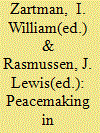

|
|
|
|
|
| Publication |
Washington, D C, United States Institute of Peace Press, 1997.
|
| Description |
ix, 412p.
|
| Standard Number |
1878379607
|
|
|
|
|
|
|
|
|
|
|
|
Copies: C:1/I:0,R:0,Q:0
Circulation
| Accession# | Call# | Current Location | Status | Policy | Location |
| 046713 | 327.172/ZAR 046713 | Main | On Shelf | General | |
|
|
|
|
|
|
|
|
|